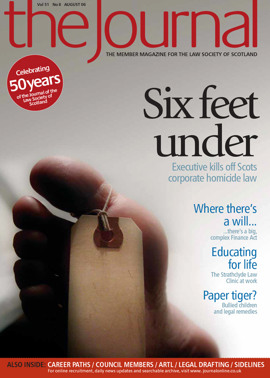With these few words...

Outwith the higher judiciary, there are few corners of the Scottish legal profession that still remain the preserve of the bar. With the recent appointment of Colin Wilson as First Scottish Parliamentary Counsel, one of the remaining redoubts of members of Faculty was breached.
The post is head of the Scottish Executive’s bill drafting team, the OSPC, to which Wilson, who began drafting legislation in 1979, succeeded on the retirement of John McCluskie QC. The takeover was a gradual one.
“My predecessor was I think the first solicitor to be appointed to the Lord Advocate’s Department in 1972, although he wasn’t long in the door before the then Lord Advocate suggested that it might be quite a good idea if he went to the bar. But from then on the number of solicitors increased and now we have a considerable majority. It really becomes irrelevant – it’s the extent of one’s drafting experience that counts.”
The acid test
It is indeed a particular skill – an art rather than a science, as Wilson comments more than once during our interview. Despite his team’s growth from six to 15 since 1999 to cope with the volume of work following devolution, drafters do not specialise in particular legal areas. Rather they take their instructions, and rely for briefing, on the separate Office of the Solicitor to the Scottish Executive (OSSE) before a policy initiative begins to metamorphose into legislation.
“We then have to be very good at getting up to speed quickly and reading up all the relevant background law, understanding the relevant cases, legislation and so on as a starting point for drafting. We do analyse quite carefully what’s being asked for; we don’t take very much for granted; we want to make sure that we really understand both the existing law and the nature of the change that’s being sought. It’s quite an analytical process.”
He continues: “It’s sometimes said that drafting is the crucible in which the policy is tested. Certainly it quite often happens, and it’s not a criticism of anybody, that the drafting process throws up things that people hadn’t thought of.” So it is that a bill will evolve first from individual clauses sent back and forth to OSSE and the policy department for comment, to fuller drafts, “until eventually we get to the stage where we’ve got something that everybody is happy is a reasonably respectable bill and ready for introduction to the parliament”.
One bite at the cherry
Parliamentary drafting does not generally get a good press. This time last year in particular, lawyer and former MSP Duncan Hamilton clamed in a Scotsman article that the Scottish Parliament was passing “confusing, contradictory and poor quality legislation”, which there was insufficient opportunity to revise. Yet despite emphasising that time is always an issue for the drafter, Wilson does not admit that the unicameral nature of the parliament is a weakness.
“I don’t think there are intolerable pressures in the system that we have to work with. You just build it into the process. Certainly we try to make the best use of the time that we have available and we need to make the best use of the process pre-introduction and to make sure that we get the bill as right as possible. It is an art and there isn’t a right way to do it, but having said that I don’t think we have felt in general that there are insuperable difficulties to getting a good quality product.”
In July the Journal carried a review of a commentary on the Mental Health (Care and Treatment) (Scotland) Act 2003 which criticised as poor draftsmanship the “jigsaw puzzle” style of the Act. Wilson admits to some sympathy with the reviewer, but pleads in mitigation that the bill was far and away the largest yet to have come before the parliament. “We just wouldn’t have thought in 1999 that we’d be doing anything of that scale… We had a very large drafting team on that bill. Nothing is perfect and I’ve no doubt that if we had our time again we would do some things differently.”
Try it and see
At least Wilson and his team can’t be accused of being set in their ways. “The main thing in terms of drafting style is that we encourage people to think how best to present a given proposition, not necessarily to be hidebound by precedent or anything, but to think how can we state this to get it across clearly and simply. For example there were people in the past who would frown on a subsection beginning with ‘But’, and there are still some who will raise an eyebrow if you do that, but often it’s the clearest way to get the proposition across. So we don’t have the grammar police overseeing all our drafting. It’s a question of stating it in a clear, comprehensible way, whatever that takes, and people are often quite inventive about the way to do things.”
Being a small team makes it all the more important for OSPC to have good relations not only with Westminster, for whom it drafts Scottish provisions of UK bills, but other English-speaking offices and particularly the Commonwealth. Fiona Kalemba of the Malawi Ministry of Justice has just been on a three-month placement to share ideas, following others from Uganda and Ghana. There is even a Commonwealth Association of Legislative Counsel which meets in conference. “The issues other drafting offices encounter are remarkably frequently the same sort of things that we are having to cope with, and the ability to look at what they’re doing and perhaps learn from them is very valuable”, Wilson explains.
A sampling of various Scottish Acts ahead of the interview tended to discount the notion that there is a recognisable Scottish approach. This year’s Housing Act, for example, at first sight is set out in a straightforward manner compared with much statute law. The Management of Offenders Act 2005, s 3 contains no fewer than 25 subsections, some of which you might think could readily be combined. And the new Family Law Act consists almost entirely of amendments to other statutes, which makes it a laborious job to work out what it actually does. (Wilson defends this format as making it easier for the end user once the amendment has been applied – perhaps more relevant once the Statutory Publications Office legislation database finally becomes available to the public, likely next year.)
Another hare shot by the interview is that bills annexed to Scottish Law Commission reports have some higher pedigree. The Commission did at one time have its own draftsman, but for over a decade the work has been done within what is now the OSPC. “As far as the Commission is concerned that gives them the benefit of the drafting team who are bang up to date with whatever is going on in terms of drafting developments. And if somebody here has been involved in the preparation of the bill it’s much easier for us to take it on and then see it through its parliamentary stages.”
Drop everything
Twice in as many months this year Wilson’s team have been faced with sudden emergency measures that forced a rapid redrawing of work schedules. One, the decision to reverse the effect of the Barker judgment on asbestos-related compensation claims, was less problematic since it was concluded that Scotland could ride on the back of the Westminster bill. The other, the bill making provision for the Lord President’s duties to be carried out during his illness, “went through the whole process in just over two weeks from a standing start to the bill being passed by the parliament, which is certainly not recommended good practice but in fact it was a good example of co-operation from all the officials involved and indeed the judiciary – everybody just pulled together to make it happen, and it did”. Even the OSPC has its excitements.
Wilson’s concluding reflections ought to strike a chord with all lawyers concerned with the accuracy of language. “The language of legislation demands quite a careful and highly-developed use of the English language, to produce a very specific result. It’s like microsurgery almost at times. The weapons at your disposal are basically the rules of English grammar and so on. I sometimes wonder whether the general increase in informality in the world at large will eventually cause problems, because there’s a loosening off of the normal rules in everyday conversation and informal writing. In a sense that is drawing further away from the precision of legislative language, and while there are pressures for drafting style to follow that, I think there is a limit beyond which you can’t go without compromising the purpose of producing a certain legal outcome.
“I’m actually quite relaxed about style, but with legislation you’ve got to make sure that a judge some years down the line understands exactly what you’re driving at. And there’s a danger that if you become too informal, people may say great, we really understand this, but in fact they don’t and all you’ve done is to blur what ought to be sharply defined edges. But the English language is developing and so is people’s usage of it, and we’re not isolated from that.”
Colin Wilson profile
Qualifications: LLB from Edinburgh University; admitted as solicitor 1975
Career: Private practice 1975-79, then joined Lord Advocate’s Department in London for drafting and legal advisory work. Returned to Edinburgh in 1999 as part of fledgling Office of Scottish Parliamentary Counsel. Appointed First Scottish Parliamentary Counsel in 2006
Job description: Ensuring Executive bills are drafted on time and to satisfactory standard. Allocating bills to drafting teams and monitoring workflow. Representing OSPC in timetabling and other discussions within Executive, and as head of Office in outside meetings. And still keeping his hand in as a drafter.
In this issue
- Ireland 4, Italy 0
- A lack of trust
- Technology and the Scottish courts
- For supplement read tax - an update
- Eyes on the ball
- Don't leave gaps in regulation
- Keeping company
- Fighting the bullies
- The university of life
- A lack of trust (1)
- With these few words...
- Tell it like it is
- All that sparkles ain't gold
- PDF is the standard
- The paper monster
- Safeguarding fair trial
- New law, new problems
- Raising the stakes
- Mark the pre-proof
- Scottish Solicitors Discipline Tribunal
- Website reviews
- Book reviews
- It takes two to tango
- Land attachment and suspensive missives
- PSG's suite moves






